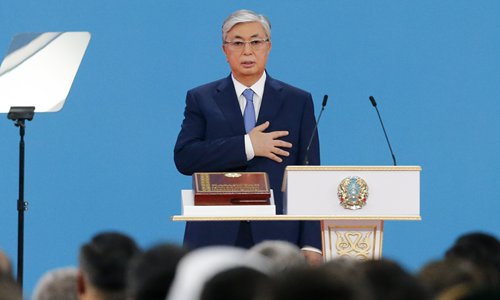HOME >> OPINION,SPECIAL-COVERAGE
Tokayev likely to continue pluralistic diplomacy
By Lu Junren Source:Global Times Published: 2019/6/13 18:13:41

Photo: IC
According to Kazakhstan's Central Election Commission on June 10, Kazakhstan's incumbent President Kassym-Jomart Tokayev won the country's presidential election, receiving 70.96 percent of the votes cast.Tokayev's election symbolizes the end of the interim period, which is vital to the stability of the country. The election is meant to unite various forces to deal with changes at home and abroad.
Undertaking sound reform should be the main aim of Tokayev's future administration. According to media reports, Tokayev has indicated he will not dissolve the government but include more young people into the Council.
The key task of the administration is to tackle development bottlenecks amid sluggish global growth.
The international financial crisis that originated in 2008 greatly affected Kazakhstan's export-based economy as commodity prices fell sharply in international markets. Various problems caused by the economic structure became increasingly apparent as social contradictions surfaced. Despite former president Nursultan Nazarbayev responding aggressively to the crisis and even dissolving the government led by then prime minister Bakytzhan Sagintayev in February, structural reforms await results.
Resolving social contradictions through development will be the leitmotif of Tokayev's new government and is clearly reflected in his election program.
On the diplomatic front, Tokayev has made it clear that he will continue on the course set by the first president, who followed a pluralistic foreign policy. The Nazarbayev era saw strategic relations develop with China, Russia, the US and the EU. It is expected that Kazakhstan-China and Kazakhstan-Russia relations will undergo little change.
Tokayev, proficient in Russian, English and Chinese, has an international perspective. Having studied and worked in China, he is pragmatic in dealing with foreign relations. China and Kazakhstan have established a comprehensive strategic partnership. The synergy of the China-proposed Belt and Road Initiative and Kazakhstan's new economic policy, "Bright Road," has brought tangible benefits to both countries. In this light, Tokayev, as a responsible politician, will continue to maintain good bilateral relations.
Russia is the most important strategic partner of Kazakhstan, sharing a high degree of political trust. Their ties span an array of economic and political issues. Relations are guaranteed by two international organizations - the Collective Security Treaty Organization and the Eurasian Economic Union. To achieve stability and development, Kazakhstan must maintain close relations with Russia. If Russia wants to maintain its influence in Central Asia and the entire Commonwealth of Independent States region, Kazakhstan's cooperation is indispensable.
The US is certainly an important factor influencing the stability of Kazakhstan. The two countries have a strategic partnership, but there has been no substantive breakthrough in past years.
When Nazarbayev visited the US in January 2018, the two sides vowed to enhance the strategic partnership. From the perspective of regional security, the importance of Kazakhstan to the US lies in "Kazakhstan's steadfast commitment to support the United States' South Asia strategy by guaranteeing continuous logistical support and access to Afghanistan."
Looking back to the history of Kazakhstan-US relations, it can be found that since the establishment of diplomatic ties in 1991, relations have been going through a flux.
The countries pull different ways over "democracy." If the White House considers specific interests, ties will likely improve. In commenting on Kazakhstan's presidential election on June 9, some European and American media outlets claimed the vote was not transparent.
In general, Tokayev's foreign policy will maintain continuity, predictability and stability. However, all observers of international affairs know that state-to-state exchanges are an interactive process with not only benign but also non-benign interactions.
The author is an observer on Central Asian affairs. opinion@globaltimes.com.cn
Posted in: ASIAN REVIEW,COMMENTS